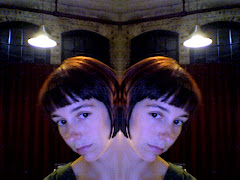As I watched the pilot episode to glee, I was reminded of a show I loved to watch when I was young, Freaks and Geeks!
href="">
Anyway....back to Glee
I organized this blog entry a little differently.
Quotes and phrases that "spoke" to me:
Sue, the cheerleading coach, names the "high school cast system" into the populars and the "invisibles" and puts the glee club in the "sub-basement."
"Myspace schedule"
"Kids feel invisable that is why they have a Myspace page"
"Tired of being laughed at"
"Being part of something special, makes people special."
"They follow the leader"
"glee conflicts with..." "reputation"
"Children like to know where they stand"
Ways this show attempts to ____________ the dominant ideologies. (Fill in the blank)
Choir teacher is apparently homosexual (or at least is portrayed as a homosexual)
Rachel has 2 homosexual fathers
They included a student in a wheelchair (although he is picked on and geekish)
Football player has a single mother, never knew his dad
Pokes fun at the coffee budget being cut for a nutritionist for the cheerleading crew
The glee club consisted of 1 Asian, 1 student in a wheelchair, 1 African American, 1 white boy with a female style voice, 1 unpopular white girl, and a jock (pretty diverse)
Shows cheerleaders cyberbullying Rachel
Overall
Enjoyable
Entertaining
Pushes back against stereotypes a bit
Strengthens other stereotypes
Inclusive
I also had a lot on teachers but thought it was not necessary to include since this is a teens in media course :)
Monday, March 8, 2010
Glee
Posted by carey at 4:14 PM 2 comments
Monday, March 1, 2010
Hip Hop...you don't stop
When reading these articles I felt very removed from the topic. Not because I do not know any hip hop but rather I never really though about hip hop as a political tool. "Hip-hop is often taken out of the existing context of political struggle, repression, or the primacy of a domestic/neo-colonialism in the service of which mass media play a (the?) leading role." Basically, hip hop is often criticized for its message and often misunderstood. I assume Ball is referring to the history of hip hop and not all forms of hip hop that exist on MTV. Over time, "The pervasiveness of self/community-directed violence, misogyny, conspicuous consumption, product placement promotion, and general lack of ingenuity in popular hip-hop is the aforementioned specific systemic need produced systematically via its media representative, in this case, the music industry." In other words, hip hop changed because of dominant society. Because of this, it is claimed that "popular culture" is nonexistent mainly because it is created by those with power. Interestingly enough, "Hip-hop’s popularity has done nothing to improve Black America’s overall wealth, education, health-care, or certainly rates of imprisonment." In fact, it has helped strengthen many of the dominant stereotypes within our society. "At times called the petit-bourgeoisie, or even the Black bourgeoisie, they are simply that group which, as administrators, administer to society that which limits or confounds ranges of thought so as to keep people from stepping – intellectually or literally – beyond acceptable parameters." This is the idea of (re)production, society creates and maintains everyone's "place." It is nearly impossible to break out of this chain but that does not mean it can not be done.
I am a bit confused about why some songs are banned, "Young Buck would not include a track called Fuck tha Police due to its 'violent content'.” What does it take for a song to be banned? Ball suggests that "Corporate lockdown of popular media is a political necessity and scientific inevitability requiring further description of this process, along with suggested avenues of resistance", but why? I really need to discuss this concept to understand it further.
As I listen to some of the music my friends listen to, I wonder how we can surpass the current hip hop vibe and gravitate towards a more meaningful hip hop representation for our young. I listen to my students singing some of the popular songs about "milkshakes" and "beckys" and wonder how this could have stemmed out of a genre that started off as a politcal and social movement?
Posted by carey at 5:25 PM 2 comments
